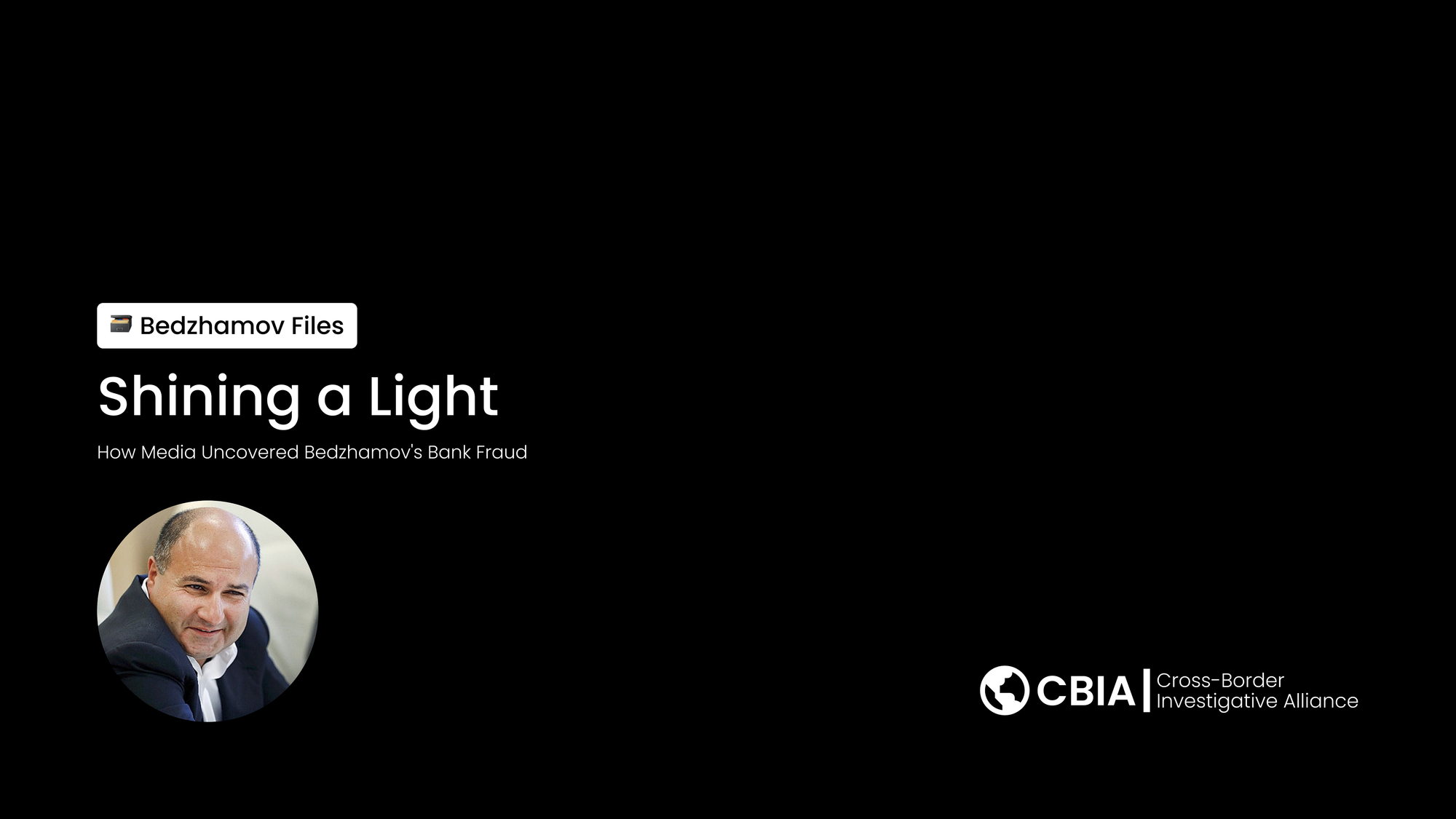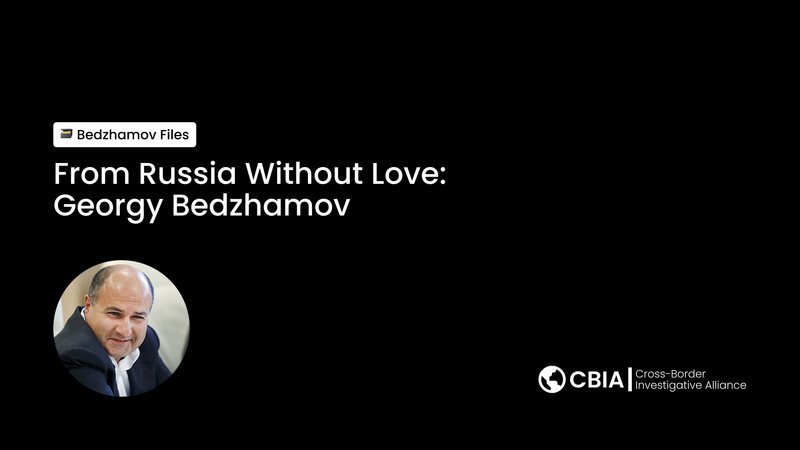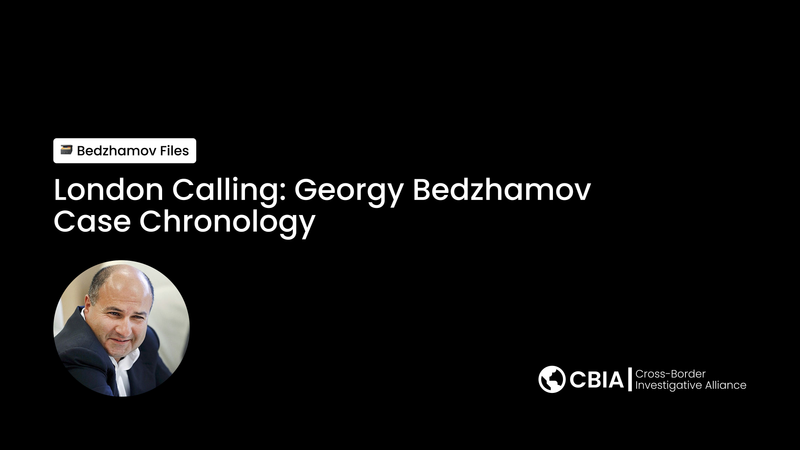Shining a Light: How Media Uncovered Bedzhamov's Bank Fraud
How journalists became the flashlight that exposed one of Russia's biggest banking scandals
In the shadowy world of financial crime, journalists often serve as the first light to pierce through carefully constructed veils of secrecy. The case of Georgy Bedzhamov and the collapse of Vneshprombank stands as a powerful example of how media investigation can expose massive fraud, mobilize public outrage, and drive authorities to action.
The Hidden Mess: What Bedzhamov Did
Imagine walking into a dark room where someone has made a terrible mess, but they've carefully hidden it from view. That's exactly what happened at Vneshprombank, once among Russia's top 40 largest banks. Between 2009 and 2015, bank co-owner Georgy Bedzhamov and his sister Larisa Markus, who served as the bank's president, systematically stole money from their own institution.
The scale was staggering: conspirators managed to embezzle about 114 billion rubles from May 2009 to December 2015, though investigations would later reveal the total theft reached 156 billion rubles (approximately $2.1 billion at exchange rates when the crimes occurred). The money disappeared through a complex web of fake loans to companies controlled by the fraudsters themselves.
The scheme worked like this: Bedzhamov and Markus would approve loans to shell companies they secretly controlled. These companies never intended to repay the money – it simply vanished into offshore accounts and luxury purchases. Meanwhile, regular depositors and creditors believed their money was safe in what appeared to be a legitimate, successful bank.
The Flashlight Moment: Media Breaks the Story
Like a flashlight suddenly illuminating a hidden mess, investigative journalists began exposing the Vneshprombank fraud in 2016. The revelation didn't happen by accident – it required painstaking detective work by reporters who understood how to follow money trails across international borders.
The Organized Crime and Corruption Reporting Project (OCCRP), a network of investigative journalists specializing in cross-border corruption cases, played a crucial role in the initial exposure. Leaked documents revealed how Bedzhamov used complex offshore structures, including Cypriot law firms, to hide stolen assets and move money internationally. These weren't simple bank transfers – they were sophisticated operations designed to make the money untraceable.
Russian media outlets, including major publications like RBC and others, picked up the story and began reporting on the bank's suspicious activities. The coverage intensified when Bedzhamov's sister Larisa Markus was arrested in early 2016, becoming the first to face charges in connection with the investigation.
The media coverage served multiple purposes: it informed the public about the massive theft, it pressured authorities to take action, and it helped investigators understand the full scope of the fraud scheme.
Public Outrage Drives Action
News reports about the Vneshprombank scandal had an immediate impact on public opinion. Russians learned that while many ordinary citizens struggled economically, wealthy bankers were stealing billions from the financial system. The media coverage transformed what could have been a quiet regulatory matter into a public scandal demanding justice.
This public pressure contributed to swift action by Russian authorities. The criminal case against Georgy Bedzhamov was initiated on January 22, 2016, shortly after media reports began highlighting the bank's problems. By March 2016, the Moscow Commercial Court declared Vneshprombank bankrupt.
The court system responded with serious sentences. Larisa Markus was initially sentenced to 9 years in prison for embezzling 113.5 billion rubles in May 2017, though this sentence was later reduced to 8.5 years on appeal. Other bank executives also faced criminal charges, with former deputy president Yekaterina Glushakova receiving 6 years in jail for embezzling 33.6 billion rubles.
Perhaps most importantly, the media attention helped authorities recover a significant portion of the stolen funds. Through asset seizures and legal proceedings, Russian authorities managed to recover approximately 143 billion rubles – nearly 92% of the total theft.
The Fugitive's Lifestyle: Media Keeps the Story Alive
While Larisa Markus faced justice in Russian courts, her brother Georgy Bedzhamov had already fled the country. But the media didn't let his escape end the story. Instead, journalists continued investigating his activities abroad, keeping public attention focused on the case.
Media reports revealed that Bedzhamov applied for asylum in the United Kingdom and continued living a comfortable lifestyle in London. This ongoing coverage served a critical purpose: it reminded the public that while some justice had been achieved, the main architect of the fraud remained free.
The persistence of media coverage also helped law enforcement agencies track Bedzhamov's activities. Reports showed Russian asset recovery firms using creative tactics, including driving mobile billboards around London's wealthy Knightsbridge neighborhood, asking residents for information about Bedzhamov's assets.
International media attention also supported legal proceedings in multiple countries. Courts in the UK have been handling civil cases related to the Vneshprombank fraud, with proceedings continuing as recently as 2024.
The Challenges Journalists Face
Investigating powerful fraudsters like Bedzhamov involves significant risks and challenges for journalists. Reporters covering financial crime often face multiple obstacles that can make their work dangerous and difficult.
First, there are physical safety concerns. Journalists investigating corruption in Russia and other countries have faced threats, harassment, and worse. The Committee to Protect Journalists documents numerous cases where reporters covering financial scandals have been intimidated or attacked.
Second, legal challenges can be overwhelming. Wealthy individuals accused of fraud often hire expensive lawyers to intimidate journalists with defamation lawsuits. Even when reporters have solid evidence, the threat of costly legal battles can discourage publication.
Third, the technical complexity of financial crimes makes them difficult to explain to the public. Journalists must understand complicated banking regulations, international money transfers, and corporate structures – then translate this information into stories that ordinary readers can understand.
Fourth, powerful individuals often use their influence to suppress coverage. They may pressure media owners, advertisers, or government officials to limit negative reporting about their activities.
Despite these challenges, the journalists who covered the Vneshprombank case demonstrated how persistent, professional reporting can overcome obstacles and serve the public interest.
The Broader Impact: Media as Financial Watchdog
The Vneshprombank case illustrates why media coverage is essential for financial accountability. Banks and other financial institutions handle enormous amounts of public money, but their operations are often opaque to ordinary citizens. Without journalists willing to investigate suspicious activities, many frauds would never be discovered.
Media coverage serves several vital functions in financial oversight:
Early Warning System: Journalists often identify problems before regulators do. Their investigations can alert authorities to suspicious activities that might otherwise go unnoticed.
Public Education: Media reports help citizens understand how financial crimes affect them personally. This education creates informed public pressure for better oversight and stronger penalties.
Deterrent Effect: Knowing that journalists are watching can discourage potential fraudsters from attempting similar schemes. The fear of exposure serves as a preventive measure.
Accountability Pressure: Media attention forces authorities to respond to financial crimes rather than ignoring them. Public scrutiny makes it harder for officials to avoid taking action.
International Cooperation: Cross-border journalism, like the OCCRP's work on the Bedzhamov case, helps authorities in different countries coordinate their investigations.
Lessons Learned: Why This Case Matters
The Vneshprombank scandal offers several important lessons about the role of media in exposing financial crime:
Persistence Pays Off: The initial media reports in 2016 were just the beginning. Continued coverage over several years kept pressure on authorities and helped track the fugitive Bedzhamov across multiple countries.
International Cooperation Works: The case showed how journalists from different countries can work together to expose cross-border fraud. The OCCRP's network approach proved particularly effective.
Following the Money: Journalists demonstrated that financial crimes leave paper trails, even when criminals try to hide their activities through complex offshore structures.
Public Engagement Matters: Media coverage that explains complex financial crimes in simple terms can mobilize public opinion and create pressure for justice.
Justice Takes Time: While media attention helped achieve some quick wins, like the bank's closure and initial arrests, full accountability required years of sustained effort.
Conclusion: The Power of Investigative Light
The Vneshprombank case proves that journalists can serve as powerful watchdogs over the financial system. Like a flashlight revealing a hidden mess, media investigation exposed a massive fraud, mobilized public outrage, and helped authorities recover billions of stolen rubles.
The success wasn't just in exposing the crime – it was in sustaining attention long enough to achieve meaningful results. Through persistent reporting, international cooperation, and clear explanation of complex financial schemes, journalists demonstrated their essential role in maintaining financial accountability.
For citizens around the world, the case offers hope that even the most sophisticated financial crimes can be exposed when journalists have the resources, courage, and persistence to shine a light into the shadows where fraud thrives. The Vneshprombank investigation shows that in an era of global financial complexity, independent media investigation isn't just valuable – it's essential for protecting the public interest.
The total recovery of 143 billion rubles out of 156 billion stolen represents more than just money returned – it represents the power of transparency to achieve justice, even when criminals believe they've hidden their crimes beyond detection.
Sources & References
Primary Investigative Sources
- OCCRP (Organized Crime and Corruption Reporting Project)
- "Fugitive Russian Banker Used Cypriot Law Firm to Hide Assets, Move Money"
- OCCRP Pandora Papers Investigation– Bedzhamov Organization Profile
Legal Documentation & Court Records
- UK Court System
- "Vneshprombank LLC v Bedzhamov & ors" – High Court of Justice, Business and Property Courts
- "Vneshprombank LLC (claimant/respondent) v Bedzhamov (defendant/appellant)" – Courts and Tribunals Judiciary
Legal Analysis
- "Sanctions case notes: Useful guidance on 'reasonable cause' – Vneshprombank v Bedzhamov" – Harneys Regulatory Blog
- "Vneshprombank LLC v Bedzhamov & ors" – Blackstone Chambers Case Summary
Financial & Business News Sources
- "UK Judge Rules Funder Is Likely Owned by Sanctioned Russians" – Bloomberg Law, May 7, 2024
- "Liechtenstein proceeds with investigation against fugitive Russian banker" – EU Reporter
Russian Media & Documentation
- "Ex-owner of Vneshprombank Bedzhamov sentenced in absentia to 14 years" – TAdviser
- "Russian Court Suspends BBC Journalist's 'Foreign Agent' Status" – The Moscow Times
Press Freedom & Journalist Safety
- Committee to Protect Journalists (CPJ)
- "How Russia's Press Freedom has Deteriorated Over the Decades Since Putin Came to Power" – PBS Frontline
- "Media freedom in Russia" – Wikipedia
- "Russia's Crackdown on Independent Media" – CSIS
International News Coverage
- "CNN, BBC, and others suspend broadcasting from Russia" – CNN Business
- "BBC Russia Editor Shares Theory Why Putin Lets Him Stay" – Deadline
- "Russia adds VOA, Current Time, BBC journalists to 'foreign agent' register" – Voice of America
Press Freedom Organizations
- Reporters Without Borders – Russia Country Profile
- Committee to Protect Journalists – Wikipedia Profile




